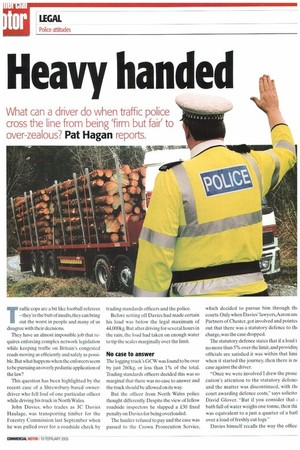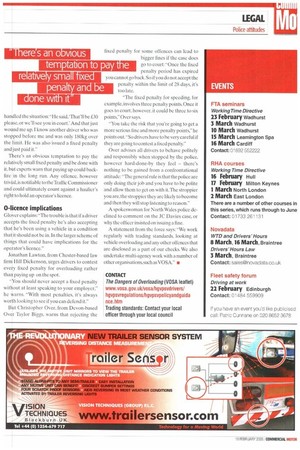eavy handed
Page 36

Page 37

If you've noticed an error in this article please click here to report it so we can fix it.
What can a driver do when traffic police cross the line from being 'firm but fair' to
over-zealous? Pat Hagan reports.
Traffic cops are a bit like football referees — they're the butt of insults, they can bring out the worst in people and many of us disagree with their decisions.
They have an almost impossible job that requires enforcing complex network legislation while keeping traffic on Britain's congested roads moving as efficiently and safely as possible. B ut what happens when the enforcers seem to be pursuing an overly pedantic application of the law?
This question has been highlighted by the recent case of a Shrewsbury-based ownerdriver who fell foul of one particular officer while driving his truck in North Wales, John Davies, who trades as JC Davies Haulage, was transporting timber for the Forestry Commission last September when he was pulled over for a roadside check by trading standards officers and the police.
Before setting off Davies had made certain his load was below the legal maximum of 44,000kg. But after driving for several hours in the rain, the load had taken on enough water to tip the scales marginally over the limit.
No case to answer
The logging truck's GOAT was found to be over by just 260kg. or less than 1% of the total. Trading standards officers decided this was so marginal that there was no case to answer and the truck should be allowed on its way.
But the officer from North Wales police thought differently. Despite the view of fellow roadside inspectors he slapped a £30 fixed penalty on Davies for being overloaded.
The haulier refused to pay and the case was passed to the Crown Prosecution Service, which decided to pursue him through th( courts. Only when Davies' lawyers,Aaron an Partners of Chester, got involved and pointec out that there was a statutory defence to tlu charge, was the case dropped.
The statutory defence states that if a load no more than 5% over the limit, and providinl officials are satisfied it was within that limi when it started the journey, then there is m case against the driver.
"Once we were involved I drew the prose cution's attention to the statutory defenc4 and the matter was discontinued, with flu court awarding defence costs," says solicit° David Glover. "But if you consider that ; bath full of water weighs one tonne, then thi was equivalent to a just a quarter of a ball over a load of freshly cut logs."
Davies himself recalls the way the office handled the situation: -He said,`That'll be DO please, or we'll see you in court.' And that just wound me up. I know another driver who was stopped before me and was only 180kg over the limit. He was also issued a fixed penalty and just paid it."
There's an obvious temptation to pay the relatively small fixed penalty and be done with it, but experts warn that paying up could backfire in the long run. Any offence, however trivial, is notifiable to the Traffic Commissioner and could ultimately count against a haulier's right to hold an operator's licence.
0-licence implications
Glover explains:"The trouble is that if a driver accepts the fixed penalty he's also accepting that he's been using a vehicle in a condition that it should not be in. In the larger scheme of things that could have implications for the operator's licence."
Jonathan Lawton, from Chester-based law firm I till Dickenson, urges drivers to contest every fixed penalty for overloading rather than paying up on the spot.
You should never accept a fixed penalty without at least speaking to your employer," he warns. "With most penalties, it's always worth looking to see if you can defend it."
But Christopher Over. from Devon-based Over Taylor Biggs, warns that rejecting the fixed penalty for some offences can lead to bigger fines if the case does go to court: "Once the fixed penalty period has expired you cannot go back. So if you do not accept the penalty within the limit of 28 days, it's too late.
-The fixed penalty for speeding, for example, involves three penalty points. Once it goes to court, however, it could be three to six points," Over says.
"You take the risk that you're going to get a more serious fine and more penalty points," he points out. -So drivers have to be very careful if they are going to contest a fixed penalty."
Over advises all drivers to behave politely and responsibly when stopped by the police. however hard-done-by they feel — there's nothing to be gained from a confrontational attitude: "The general rule is that the police are only doing their job and you have to be polite and allow them to get on with it. The stroppier you are.the stroppier they are likely to become and then they will stop listening to reason."
A spokeswoman for North Wales police declined to comment on the JC Davies case, or why the officer insisted on issuing a fine.
A statement from the force says: "We work regularly with trading standards, looking at vehicle overloading and any other offences that are disclosed as a part of our checks. We also undertake multi-agency work with a number of other organisations, such as VOSA."
CONTACT The Dangers of Overloading (VOSA leaflet) www.vosa.gov.uk/vosa/hgvpsydrivers/ hgvpsvregulations/hgvpsvpolicyandguida nce.htrn Trading standards: Contact your local officer through your local council






































































































































































































